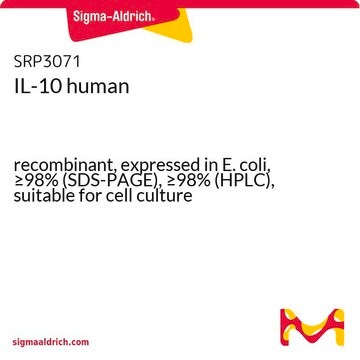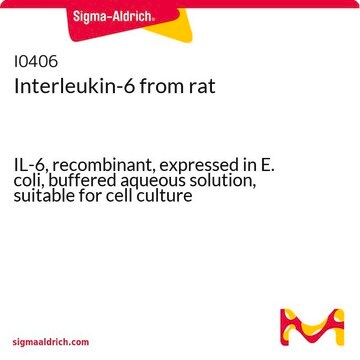SRP3096
Interleukin-6 human
Animal-component free, recombinant, expressed in E. coli, suitable for cell culture
Synonyme(s) :
Interleukin-6 human, IL-6
About This Item
Produits recommandés
Source biologique
human
Niveau de qualité
Produit recombinant
expressed in E. coli
Pureté
≥95% (SDS-PAGE)
Forme
lyophilized
Puissance
≤2.0 ng/mL ED50
Poids mol.
20.9 kDa
Conditionnement
pkg of 100 μg
pkg of 20 μg
Technique(s)
cell culture | mammalian: suitable
Impuretés
≤1 EU/μg endotoxin, tested
Numéro d'accès UniProt
Conditions d'expédition
wet ice
Température de stockage
-10 to -25°C
Informations sur le gène
human ... IL6(3569)
Vous recherchez des produits similaires ? Visite Guide de comparaison des produits
Description générale
Application
Actions biochimiques/physiologiques
Conditionnement
Séquence
Forme physique
Reconstitution
Mention d'avertissement
Warning
Mentions de danger
Conseils de prudence
Classification des risques
Eye Irrit. 2 - STOT SE 3
Organes cibles
Respiratory system
Code de la classe de stockage
11 - Combustible Solids
Classe de danger pour l'eau (WGK)
WGK 1
Point d'éclair (°F)
Not applicable
Point d'éclair (°C)
Not applicable
Certificats d'analyse (COA)
Recherchez un Certificats d'analyse (COA) en saisissant le numéro de lot du produit. Les numéros de lot figurent sur l'étiquette du produit après les mots "Lot" ou "Batch".
Déjà en possession de ce produit ?
Retrouvez la documentation relative aux produits que vous avez récemment achetés dans la Bibliothèque de documents.
Les clients ont également consulté
Protocoles
XTT assay protocol for measuring cell viability, proliferation, activation and cytotoxicity. Instructions for XTT reagent preparation and examples of applications.
MTT assay protocol for measuring cell viability, proliferation and cytotoxicity. Instructions for MTT reagent preparation and examples of applications.
MTT assay protocol for measuring cell viability, proliferation and cytotoxicity. Instructions for MTT reagent preparation and examples of applications.
Protocole du test au MTT pour la mesure de la viabilité, de la prolifération et de la toxicité cellulaires. Instructions de préparation du réactif au MTT et exemples d'applications.
Notre équipe de scientifiques dispose d'une expérience dans tous les secteurs de la recherche, notamment en sciences de la vie, science des matériaux, synthèse chimique, chromatographie, analyse et dans de nombreux autres domaines..
Contacter notre Service technique












